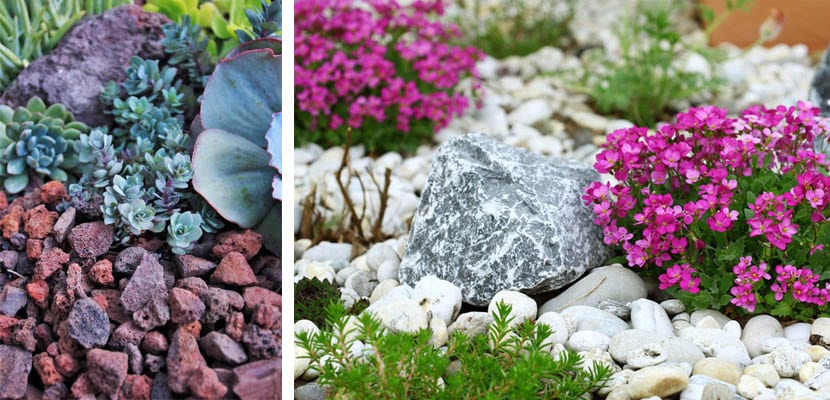
Garden stones are a great landscaping tool to create more attractive outdoor spaces. Thanks to them we can mold and renew the aesthetics of the garden in a simple way and also help protect the land from sudden changes in temperature. Because beyond the practical function, using garden stones has many practical advantages.
Volcanic gravels, boulders, river bowling, rockery ... each stone has its own characteristics. We can use only one of them or bet on sets of stones of different sizes and colors to provide the outdoor spaces of a greater personality. Do you need inspiration?
Advantages of using garden stones
Decorative garden stones allow us to create very personal spaces in our garden. Using them in landscaped outdoor spaces, however, has many other advantages related to their maintenance and saving water.
- Great decorative possibilities. Each type of stone has its own characteristics in terms of shape, size and color, which allows us to give a very personal touch to our garden using one or more types of stones combined to create different motifs and contrasts.
- Easy installation. You can install them yourself. You will only have to remove the weeds, compact the land and place an anti-weed mesh before dumping the chosen aggregate.
- They save water. They prevent the evaporation of water from the soil and thus optimize irrigation. A feature that makes them especially interesting to decorate dry terrain.
- They protect the roots. They protect the roots from the damage that can be caused by frost and excess heat.
- They hinder the proliferation of weeds. Herbs that compete with ornamental plants for water, soil nutrients, and light.
- Low maintenance. The rocks are resistant to changes in the weather and can be exposed to the elements for years without suffering, practically, alterations.

Types of garden stones
Small and medium-sized decorative stones can help us to improve aesthetics of ours thanks to its diversity of sizes, colors and textures. The larger ones are great allies when it comes to creating flat terraces in gardens with large slopes. Small and medium-sized ones, on the other hand, increase the interest of areas with few plants and become an essential part of dry gardens, of the Japanese type.
According to the material
In the market you will find both expanded clay and decorative stones made of different natural materials. for your garden. The different materials will influence their aesthetic characteristics and their color. The most common are:
- Expanded clay: They are balls of natural clay of terracotta color, light, porous and of regular size, expanded by thermal action.
- Volcanic gravel: 100% natural volcanic pozzolana, reddish in color. It is extremely porous and light and comes in different granulometries: 4-7, 7-12 and 14-25 mm.
- Marmoline: Small fragments of natural marble with sharp edges. It can be white, pink, reddish, ivory, dark green, and black. And like the previous one, it is presented in different granulometries: 9-12, 12-18 and 18-25 mm.
- Marble bolus: Natural marble stones with rounded edges available in different sizes: 12-20 and 20-40 mm, and colors: white, pink, red, dark green and black.
- Moonstone: Highly porous black artificial gravel.
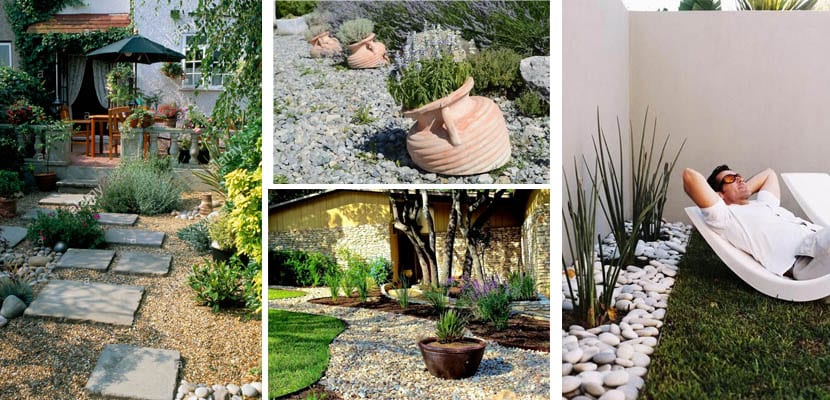
Depending on the size, shape and finish
Gravel, boulders, pebbles, rockeries ... normally when we buy garden stones we do it using this classification based on both size and size. angled or rounded finish from the same. Do you want to know the characteristics of each of these decorative stones and what you can use them for?
records
Gravel is a small crushed natural stone with great decorative possibilities thanks to the variety of colors it can present. It is perfect for tight budgets; it is unpolished and has edges, characteristics that make its cost considerably lower than that of rolled edge.
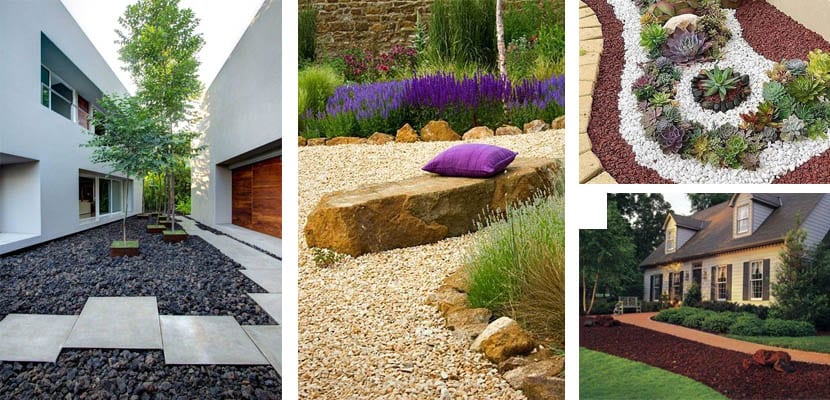
It is usually used to cover paths, upholster the ground in large garden areas or as a filling for flower boxes. The gravel of volcanic origin are highly appreciated for their color to create gardens with succulent and succulent plants. But both those of one and another color are perfect for their size to cover any surface without gaps appearing in it.
Boulders
The boulders have a polished and rounded finish very attractive. This non-abrasive finish allows you to walk comfortably on them, which makes them a good option for upholstering paths and garden paths. Colo occurs with gravel, in addition, its size allows total coverage of the land with some ease.
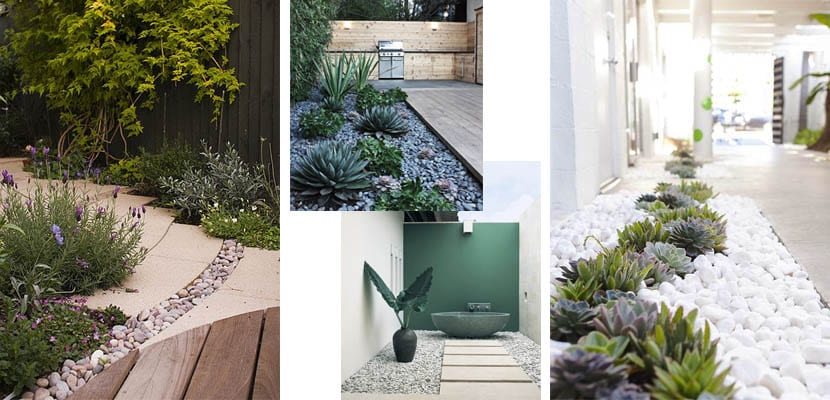
Pebbles come in various sizes and come in a variety of colors, which can help you create elegant outdoor spaces. White pebbles are especially appreciated to create low-maintenance spaces in combination with aromatic plants, boxwood, small palm trees or olive trees.
River bowling
River bowls are rounded stones larger than boulders that are used as a decorative and ornamental element in gardens, fountains and waterfalls, among others. Due to their size, they are also frequently used to delimit different areas and separate different types of gravel.

Rockeries
Rockeries are limestone stones that present indentations or holes by erosion. Due to their appearance and natural character, they allow us imitate mountain spaces. They are the most appreciated when it comes to shaping uneven and steep terrain. They help us to create small flat terraces in which to place different groups of flowers.
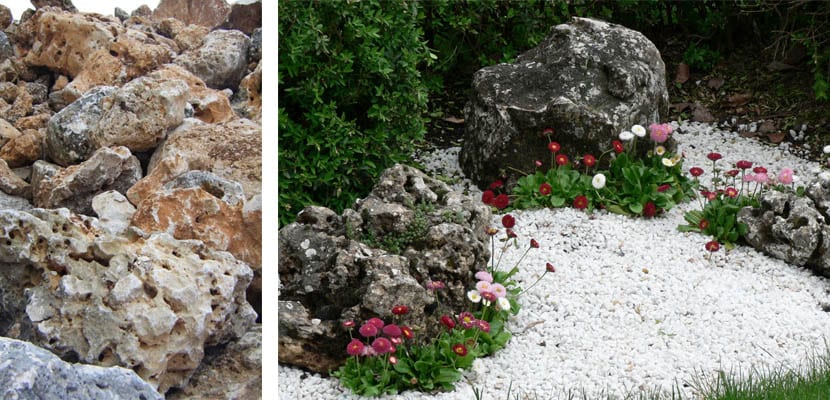
In the same way, they are ideal for generating fictitious volumes or slopes on flat terrain. The best thing to do for this is to place vegetation that grows in height at the back of the rockeries, and in the front, small plants that give color to the whole.
These sets of stones are perfect to be accompanied by any type of plant, whether vertical or creeping. They look especially with wild-sourced plants and they are perfect for succulents, plants that, due to their characteristics, are capable of growing on rock.
Do you have decorative orders in your garden? How do you use them?